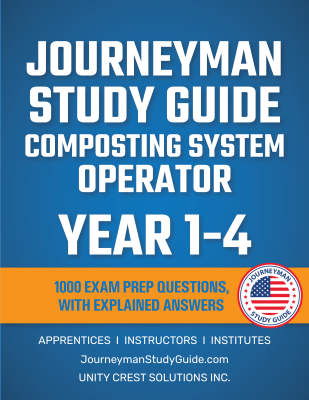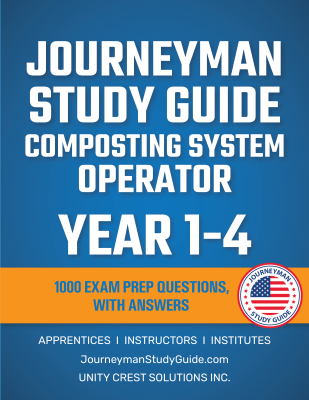Questions, Answers, & Explanations
Get clear explanations behind every answer, perfect for deeper learning and more thorough exam preparation.
Site Updates in Progress: Things might look different as we work on enhancing your experience.
What is a Composting System Operator?
Composting system operators are responsible for managing large-scale composting facilities that process organic waste into nutrient-rich soil amendments. These professionals oversee the collection, processing, and quality control of compost to ensure compliance with environmental regulations and industry standards. Their work is critical in agriculture, landscaping, and waste management, helping reduce landfill waste and promote sustainable soil health practices across the United States.
Key Responsibilities
Composting system operators perform a variety of essential tasks to maintain efficiency and regulatory compliance, including:
Skills and Traits for Success
Successful composting system operators require a blend of technical knowledge, problem-solving abilities, and environmental awareness:
Industries Where Composting System Operators Thrive
Composting professionals play a vital role in multiple industries:
Why Choose This Career?
Composting system operation is a growing field with increasing demand for skilled professionals:
Get Certified and Advance Your Career
Becoming a certified composting system operator boosts career prospects and earning potential. Our Q&A products, interactive online tests, and study guides help professionals master industry concepts, regulatory standards, and best practices.
What to Expect on the Composting System Operator Certification Exam
The Composting System Operator Certification Exam evaluates a candidate’s knowledge of composting processes, environmental regulations, equipment operation, and safety protocols. Many composting facilities, municipal waste management agencies, and agricultural operations require certification to ensure compliance with EPA and state waste management laws.
Exam Format
The certification exam typically consists of multiple-choice and practical application questions covering:
Key Topics Covered
Passing Requirements
Most certifying bodies require a minimum score of 70% to pass the written exam. Some programs may also include a practical skills assessment, where candidates demonstrate equipment operation and compost management techniques.
Prepare with Confidence
Our Q&A and Q/A Explanation study materials break down complex topics into easy-to-understand content. Our interactive Online Tests simulate real exam conditions, providing a running score and instant feedback.
What Types of Questions Are on the Exam?
The Composting System Operator Certification Exam evaluates knowledge of composting science, safety procedures, and operational efficiency. Understanding common question formats will help ensure success.
Common Question Formats
Sample Questions
Study Smarter, Pass Faster
Our Q&A products help pinpoint weaknesses, while our Q/A Explanation resources provide deeper understanding. Online Tests give real-time feedback to prepare for success.
What Is a Typical Workday Like?
The daily routine of a composting system operator is both hands-on and analytical, requiring a balance of physical labor and technical expertise. Work typically begins early in the morning and follows a structured process to ensure efficient operations.
Morning: Preparing for the Day
Midday: Active Composting Operations
Afternoon: Finishing Tasks & Site Maintenance
Long-Term Career Opportunities
Composting system operators can grow their careers in various ways, from technical specialization to management roles. Career progression typically follows these steps:
Union & Industry Certifications
How Much Can You Earn as a Composting System Operator?
Wages for composting system operators vary based on experience, location, industry specialization, and certification level. With growing environmental awareness and state-mandated composting regulations, demand for skilled operators is on the rise.
Wage Breakdown by Experience Level
Factors That Impact Earnings
Career Stability & Financial Growth
With the push for zero waste initiatives and organic waste diversion programs, composting system operators enjoy steady job security and long-term wage increases.
Increase Your Earning Potential
Advance your career with Q&A study materials, certification prep courses, and interactive online tests to improve industry knowledge and maximize job opportunities.
Essential Tools for Composting System Operators
Composting system operators rely on specialized equipment, safety gear, and analytical tools to manage large-scale organic waste processing efficiently.
Must-Have Tools for the Job
Top U.S. Suppliers for Composting Equipment
Recommended Training & Certification Programs
Why the Right Tools & Resources Matter
Access to high-quality equipment, training, and industry resources significantly enhances job efficiency, career growth, and workplace safety in the composting industry.
Get Equipped for Success
Prepare for your certification with our comprehensive study guides, Q&A resources, and interactive online tests designed for composting system operators.
Where Can You Train to Become a Composting System Operator?
Composting education and training programs provide hands-on instruction in waste management, environmental science, and large-scale composting operations. These programs prepare students for careers in municipal composting facilities, organic farming, and industrial waste management.
Types of Training Programs
Key Skills Taught in Training Programs
Choosing the Right Program
Advance Your Skills with Professional Training
Becoming a certified composting system operator requires technical knowledge, hands-on experience, and regulatory training. Our Q&A study materials and interactive tests help you reinforce key concepts and prepare for exams.
Why Join a Union or Work with a Reputable Employer?
Union membership and working with leading employers provide job security, competitive wages, and career growth opportunities. The Laborers’ International Union of North America (LIUNA) and United Steelworkers (USW) represent composting professionals, offering training, benefits, and advocacy.
Benefits of Union Membership
Top Employers in Composting & Waste Management
Find the Best Career Opportunities
Enhance your employability by getting certified and joining a union. Use our study guides, Q&A materials, and online tests to ensure success.
How to Stay Ahead in the Composting Industry
The composting industry is evolving rapidly due to advancements in technology, sustainability practices, and regulatory requirements. Composting system operators who stay informed about industry trends and develop specialized skills will have better career opportunities and job security.
Emerging Trends in Composting
Best Practices for Career Growth
Challenges & Opportunities in the Industry
Staying Competitive in the Job Market
Continuous learning and skill-building are essential for long-term success. Our Q&A materials, Q/A Explanation guides, and interactive online tests help composting system operators stay ahead of industry trends and prepare for certification exams.
Get clear explanations behind every answer, perfect for deeper learning and more thorough exam preparation.
Quick and easy practice to test your knowledge anytime, anywhere—ideal for simple, on-the-go preparation.










